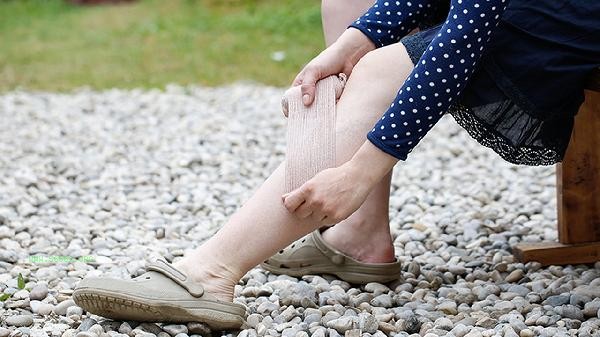Leg cramps may be related to calcium deficiency, zinc deficiency, or other factors. Common reasons include insufficient calcium intake, abnormal zinc metabolism, excessive exercise, poor blood circulation, neuromuscular disorders, etc.

1. Calcium deficiency
Calcium ions participate in the regulation of muscle contraction and relaxation. Long term insufficient calcium intake may lead to increased excitability of nerves and muscles, causing muscle spasms in the calf or foot. Daily calcium can be supplemented by drinking milk, consuming soy products or green leafy vegetables. For severe calcium deficiency, medication such as calcium carbonate D3 tablets and calcium gluconate oral solution should be taken under the guidance of a doctor.
2. Zinc deficiency
Zinc deficiency may affect electrolyte balance and protein synthesis, indirectly leading to muscle spasms. Oysters, beef, and other foods are rich in zinc. Patients with zinc deficiency can follow medical advice to use supplements such as licorice zinc granules and protein zinc. However, the occurrence of cramps caused solely by zinc deficiency is relatively rare, usually accompanied by symptoms such as decreased appetite or weakened immunity.
3. Excessive exercise
Lactic acid accumulation or muscle fatigue after intense exercise may induce transient cramps, especially in high temperature environments. Adequate warm-up before exercise, timely supplementation of electrolyte containing drinks during exercise, and moderate stretching after exercise can reduce the probability of occurrence.

4. Poor blood circulation
Varicose veins in the lower limbs or prolonged fixed posture may obstruct local blood circulation, leading to muscle ischemic spasms. It is recommended to avoid prolonged sitting and standing, raise the lower limbs during sleep, and if necessary, wear medical elastic socks to improve circulation.
5. Neuromuscular disorders
Diseases such as lumbar disc herniation or multiple neuritis may compress nerve roots, causing abnormal muscle contractions in the lower limbs. This type of situation needs to be diagnosed through electromyography and other examinations, and nutritional and neurological drugs such as mecobalamin tablets and vitamin B1 tablets can be used to treat the primary disease. Preventing leg cramps requires comprehensive adjustments to lifestyle habits. Ensure a daily intake of 300ml of dairy products and moderate amounts of seafood, and avoid exercising on an empty stomach or suddenly increasing the amount of exercise. Bone mineral density and serum trace element levels can be regularly measured in middle-aged and elderly people. diabetes patients need to pay attention to monitoring blood sugar to prevent peripheral neuropathy. People who frequently experience cramps at night can try soaking their feet in warm water before bedtime and massaging their calf muscles. If the symptoms persist for more than two weeks or are accompanied by swelling, numbness, and other symptoms, they should seek medical attention promptly to investigate potential diseases such as thyroid dysfunction and renal insufficiency.









Comments (0)
Leave a Comment
No comments yet
Be the first to share your thoughts!